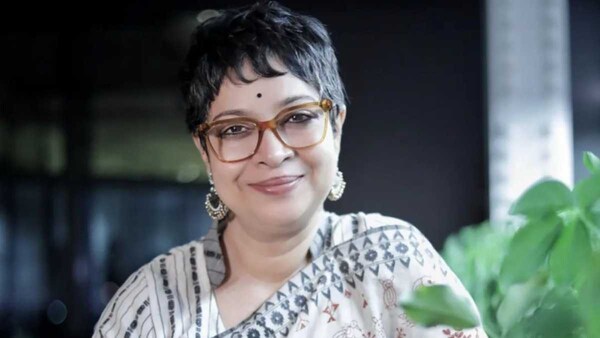Churni Ganguly on Rocky Aur Rani Ki Prem Kahani: Karan Johar is an active director on sets
As Alia Bhatt and Ranveer Singh are all set to come to Kolkata to launch a brand new song, Dhindora Baaje, Churni Ganguly talks to OTTplay about her experience of working with Karan Johar

Last Updated: 11.46 AM, Jul 24, 2023
Bengali actress Churni Ganguly’s ‘laundry’ interaction with Ranveer Singh in the trailer of Rocky Aur Rani Ki Prem Kahani has left everyone in splits. Known to be one of the finest actresses, Churni is geared up with one of the grandest releases in her career. As Alia Bhatt and Ranveer Singh are all set to come to Kolkata to launch a brand new song, Dhindora Baaje, on Monday, the veteran Bengali actress decodes the ‘laundry scene’ and talks to OTTplay about her experience of working with Karan Johar, and her takeaways from the film. Read on…
Let’s start with the ‘laundry scene’ that has left all of us in splits in the trailer. How was it designed and how was the shooting experience?
We all had great fun shooting the scene. We were laughing and those who were at the monitor were also laughing. Ranveer and I kept on improvising the shot. In fact, Karan was very excited and he kept coming to us and improvising the shot. He suggested a range of improvisation. This was true for almost all my scenes in the film. We all had great fun. We laughed out loud after the funny scenes. The inherent comedy of the script touched us deeply while working on it.
How did you get the offer of Rocky Aur Rani Ki Prem Kahani?
The offer came when I was shifting home. Someone called and said that it was from Dharma Productions and they wanted me to send them a video for a Karan Johar film. My house was in a mess with packing boxes scattered everywhere. It was too chaotic for me to be able to compose and do the recording. I actually delayed the process a bit. They called up and said, ‘We are sending you a character reference photo.’ when they sent it, I saw it was my photo. I was very impressed to understand that they had me in their mind for the character. Anyway, as soon as I sent the video recording, I got a call and they said Karan loved it and he wanted to meet. I went to Mumbai. Karan elaborated on the story and explained my scenes. He sent me the script and told me that if there was any doubt, question, or suggestion, I should call him directly. There would be no in-between people. And that happened. I called him with my questions or suggestions directly. That made things easier because he was in Mumbai and I, was in Kolkata. A direct communication always helps in such situations.
How was Karan Johar as a director? Was he a hands-on director?
His suggestion of directly calling him talks a lot about him, does it not? As a director, he is always available. He would always get up from his monitor and come to the actors when he wanted to suggest something. He would act in front of you sometimes. We used to pull his leg, saying, “You secretly wanted to be an actor but ended up a director. Karan is an active director on sets.
You play a member of a probashi Bangali household. How did you prepare for the character and the dialect of Hindi?
I asked them about the character and the background and what should be the proficiency level of Hindi for a Bengali woman. It was general Hindi. Since Bengali doesn’t have gender-specific verbs, we face problems while speaking Hindi. The film has a lot of idiosyncratic moments but it treats the culture respectfully. About preparing for the character, I read the script thoroughly. I kept on talking to Karan and those exchanges were very helpful. He explained very nicely and thoroughly. He explained what he wanted. Every time he okayed by shots, I knew I could make it right.
In the film, Alia seems to be a Bengali girl. How did she perform as a Bengali girl?
Quite well, actually. I have not seen all of her scenes but as much as I have seen her she is very good. She prepared herself for the character and she was always prepared for the day. She used to ask for suggestions – if she could say something or react in a certain way. And she would take suggestions. And she always used to interact. Of course, her performance is out of the world. She used to improvise and give her input. I, as an actor, feel more and more inputs help develop a film. Alia is very pleasant, polite, gentle, and hardworking.
And Ranveer Singh? He seems to be one of the most energetic people in front of the media…
He is exactly like that even behind the camera. He brings a lot of energy to the sets. Every day he used to come to set, meet and greet everyone, offer hugs, and then start his day. He is punctual (all are very punctual and professional) and never late. But he is not the one who would arrive on the set and get into his zone. He would meet everyone and then start work. Also, not just that he focuses on his own work, which he does anyway as one of the great actors, he observes other people’s work. He came back to me a number of times and told me how I delivered a dialogue following my style. He would be like, ‘You did this scene very well.’ He would imitate my style and tell me what he liked. I really liked this side of him. Everyone focuses on their own work and doesn’t watch other people’s work. He does and I think that is a big deal.
RARKPK is one of the biggest films in recent times in terms of scale. What are your takeaways from working on this film?
They operate on a bigger scale. They took great care of us in terms of hospitality. There never made us feel like an outsider. While watching their scale of operation, I used to think about how many Bengali films we could have made on this budget. Having said that I also felt how beautifully we make films in our Bengali industry despite having a fraction of its budget. We also tell fascinating stories with a smaller amount of money and tell them nicely. I am very proud of that. It shows how creative we are. Our films get global nods and that is a matter of pride for me. We don’t have the reach that they have but we have stories to tell.
You have worked in the Bengali film industry for a long time. Do you think your talent is utilised?
I could only answer if I was utilised properly if I would get a chance to work with many people. I did not. They probably think I am overrated. Perhaps they did not need me. I feel I have a lot to give. I don't think my short hair is, by any means, a problem. I have beautiful wigs. I used them well in Kaberi Antardhan and Shubho Bijoya. Not very many offers come to me. I think this question needs to be answered by the makers and not me. Perhaps they think I am not up to the mark. Maybe they don’t have anything suitable for me. Or maybe they think I would only work with Kaushik.
You are often seen as an elite woman. Do you think that perception could be one of the reasons…
When I started my career, I worked as Kundanandini in Bishbrikkho. She is an outright rural woman. My portrayal was appreciated by everybody. In Hindi, I worked on a project, Chhoti Si Asha. I have played a character of an ordinary woman who loses her husband and gets completely lost in life. That character was also quite well-loved. I worked on a lot of characters that are ordinary women. As an actress, if I don’t get to deconstruct my image then what’s the point? But I will have to get that offer to do so. I don’t get that many offers.

 Premium
Premium